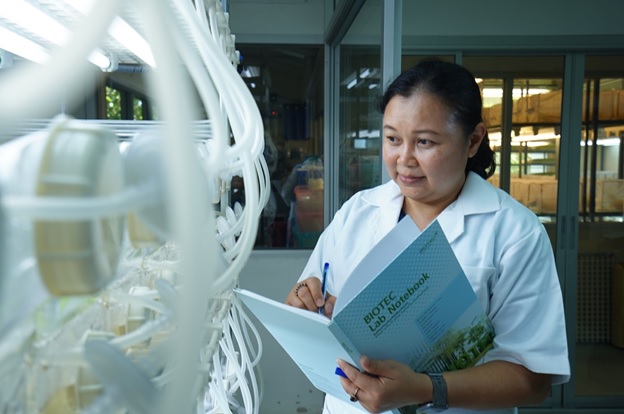BIOTEC-NSTDA, in collaboration with the Innovation and Technology Assistance Program (ITAP) and the Agricultural Research Development Agency (Public Organization), has developed a bioreactor system to improve production efficiency of economic crops to meet growers’ demand.
One of obstacles of plant production in Thailand is the availability of superior variety seedlings, especially with slow-growing crops like palm family, e.g. oil palms, coconuts and date palms. Although several crops can be propagated with seeds, it is not recommended because there will be much variation within the progeny, and desirable characteristics of the parent tree may be lost. Seed propagation is also a time-consuming and labor-intensive process. In the case of dioecious species like date palm which produces male and female progeny, growers run the risk of planting male seeds that do not bear fruits. These drawbacks can be overcome with tissue culture propagation which gives clones genetically identical to the mother and all the daughter plants.

Dr. Yeetoh Dabbhadatta, BIOTEC Researcher of Innovative Herbal Plant Factory Research Team, reveals that BIOTEC has been investigating tissue culture technique to propagate long-lived economic plants such as oil palms and coconut. The research team further advanced their investigation into a bioreactor system using liquid media which has potential to improve production efficiency. The team has successfully developed a bioreactor system for coconut and oil palm. The system allows callus to be formed 3-4 faster than the tissue culture method using solid media.

In addition to reducing production time, a bioreactor system offers an advantage of controlling the amount of nutrients promoting bioactive compound production in medicinal plants. The team is therefore developing the bioreactor system for mass propagating Thai herbal plants such as turmeric, Curcuma aeruginosa, Curcuma comosa, wild turmeric (Curcuma aromatica), zedoary, white turmeric and black galingale. This project will make medicinal plants more accessible to growers, and also support the conservation of herbal species which are becoming rare in the natural habitat.
